Marcin Wrona. One of the most gifted Polish directors of our time as evidenced by films such as “The Christening”, “My Flesh My Blood” and now DEMON. Sadly, we lost Wrona last year at a time which myself, and many others, believe to be the height of his storytelling with only greater things to come in the future. But Wrona’s work lives on and thankfully, DEMON, has now made it to the United States after a hugely successful European run. Carrying on in his stead is DEMON Executive Producer and Wrona’s business partner and now widow, Olga Szymanska.
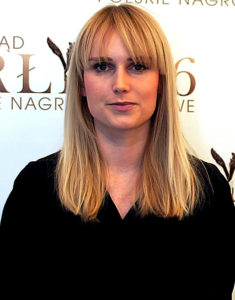
In the United States promoting DEMON, Szymanska recently made her first trip to Los Angeles, during which I had the privilege of not only sitting down with her for this exclusive interview, but also moderating a well-attended screening and Q&A with her as we talked all things DEMON.
DEMON is, in a nutshell, twisted and cool with a twist on the Jewish lore of the dybbuk and a meld of Polish and Jewish culture set against a wedding. Timeless, classic and beautifully lensed, the wedding day story of Pyton and his bride Zaneta is strengthened by the ambiguity of events and the patented Wrona juxtaposition of life and death, good and evil. Riveting, genres meld as one is swept up in this moment in time, developing a personal introspection given what has just unfolded on screen.
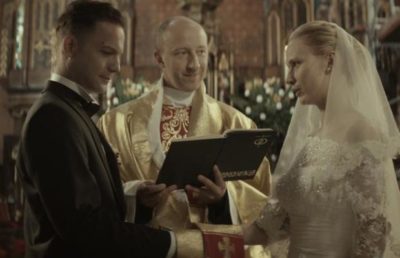
One of the keys to DEMON is that sub-titles (the film is in Polish) are not necessary to know what the story is, what is occurring. Performances and visuals are equally strong, conveying the emotion of the story, something important to both Wrona and Szymanska. “The United States market is so different from European market in terms of movies. I’m very happy that it’s clearly understandable here and that all the talks I’ve had so far regarding the movie are just perfect. All the questions, all the doubts that people have. They are exactly as it should be, as we planned.”
Working hand-in-hand with Wrona from story inception to funding to shooting and post, Szymanska is forthcoming about their intention with the film. “The idea was we wanted to make it universal; universal in time, universal in place. That’s why we never say where we are. We are somewhere in the countryside of Poland. We never say exact time when we are. That’s why the cinematography, the costumes, the set design are like this. We wanted to make this out of space, out of time. The cinematography is supposed to be like the old picture.”
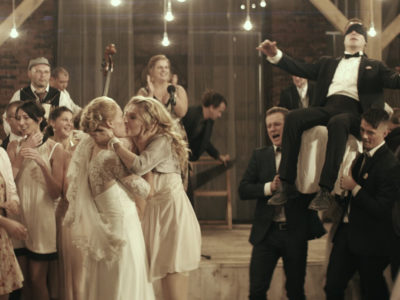
Using an old sepia photograph depicted early in the film as the visual jumping off point, Wrona and his cinematographer Pawel Flis set out to design the visual look and style of DEMON. “Marcin and Pawel wanted to make it static with slow, very slow, very little movement of the camera. But once they started shooting and they were going into the wedding, which was crazy and more crazy, they decided they need the camera movement to make it even more cultic and more crazy. The initial idea changed for the cinematography. But when everything is slowing down again, we’re going back to the static shots. The camera movement depends on what’s going on on set.” The cinematography dazzles in DEMON. Framing is exemplary as is the lighting, but it’s the hand held 360 degree lensing of the wedding, complete with fish-eye views and slo-motion that fuels the ambiguity of the story; are the guests drunk on vodka or is something else at play? A soft “cheesecloth effect” creates a haze over the screen, establishing a visual metaphor designed to pique the curiosity of the audience. As a wonderful sense of imbalance is created on-screen and off, we wonder if our groom Pyton is going crazy, just drunk or possessed, while juxtapositioned against that is the timeless beauty of the soft sepia haze.
As Szymanska explains it, “The idea was this location and the whole wedding was supposed to be perfect. Everything was prepared. The land is beautiful. The weather is great. Then everything just falls apart. It was this perfect day that is ruined and we don’t know why it’s ruined. We don’t know. As you said, again, you read it perfectly, you say that we don’t know whether he [Piotr/Pyton] is mentally ill or he’s just ill or he’s possessed. That was our intention that we don’t know it until the very end.” Adding to the ambiguity are subtle special effects facial transformations in several of the characters. Occurring at the most surprising moments, Wrona keeps us on our toes, yet never takes us out of the moment.
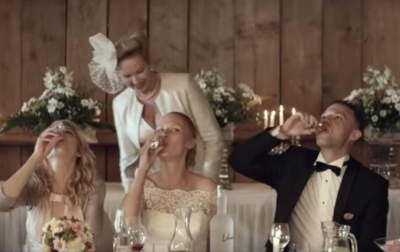
Critical to DEMON is its casting, starting with Israeli actor Itay Tiran as Piotr ‘Pyton’. Scripted as a Brit, an outsider coming into this very closed Polish community, the effect is striking in terms of storytelling. Important to Szymanska and Wrona was that “We wanted him to be a stranger in her town. We wanted him to be someone with relatives and that we don’t know where he comes from.” Doing due diligence in their research, history itself comes into play with the character. “We decided to make him British because of the emigration to Britain after the war, maybe he had some Polish-Jewish ancestors. We know they were Polish because he says ‘I know this song from my grandmother’, but we barely know anything about him. [Reading] in between the lines, he might be Jewish. That’s why he has all this Jewish customs – he breaks the glass with his foot and some other kind of behaviors, but again, we don’t know whether it’s a possession or it comes from that he learned it in his family house. We don’t even know if he’s aware of all these things that he’s doing.”
Surprising is the amount of input Szymanska and Wrona received from outside sources when it came to the script and characters. Chuckling, Szymanska relates an incident involving the dybbuk. “The funny thing is that when we were working on the script and we applied for the Film Fund grant, one of the readers in the Film Institute is Jewish, a 70-80 year old man. In the first [script] version, Piotr is Polish and he said, ‘No! No! The dybbuk cannot go to a Polish person. It can only go to a Jew. You need to change it. It cannot be like this.’ . . . He was talking about dybbuk as a real thing. In between the words, [we know] Piotr is Jewish. That’s why we wanted an Israeli actor to play him so it’s even more meaningful.”
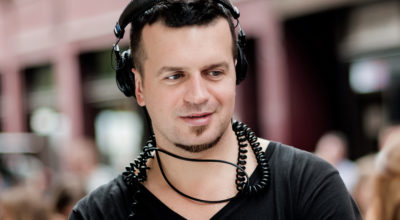
Describing it as “very difficult” to craft the script, Wrona and his writing partner Pawel Maslona pay great attention to detail, paying homage to and incorporating both Polish and Jewish traditions as well as Polish folklore and elements of Judaism. As she laughingly recalls, according to Szymanska, “There was a lot of research and there was a lot of help from the Israeli side because Itay [Tiran] came with his ideas as well. Lots of things were happening on set. The script was read by the Polish rabbi, also read by some Jewish Yiddish consultants. We had some help from our friends in Israel so they added small things. . .I remember when we first came up with the idea of making this movie, we went to Haifa Film Festival and we stayed with our friend Danny Rosenberg who’s an Israeli director and a friend of Marcin’s from some workshops. We stayed in his house and we started talking about dybbuk. He was like, ‘Let’s see on the YouTube.’ There are some sites that were not available in Poland. We were trying to find it in Poland, but it was impossible. He found some kind of dybbuk possession films from the real thing, happening on the street. It was made real, with real exorcisms filmed and these kinds of things.” Almost like a ‘Dybbuk for Dummies’, Szymanska and Wrona were “completely shocked” at what the videos disclosed. “We started talking about the dybbuk and how they find it in Israel. It’s only one branch of Judaism that believes in dybbuk. Not Orthodox. It’s more Hasidic branch of believing in the dybbuk. But still, there are people who actually believe that dybbuk exists and that you might be possessed.”
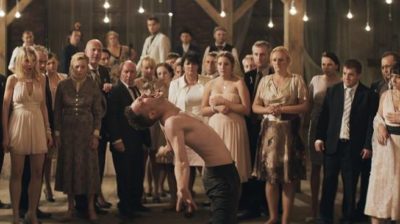
With suggestions and script changes ongoing, as a producer, Szymanska had to think fast on her feet, especially where financing was concerned. DEMON is not exactly a film which potential investors jump at. “We got the main financing from the Polish Film Institute which was, at the end, about 60% of the budget. We started with a very low budget. The Polish Film Institute money was about 70% of the money at the beginning, but at the same time we were waiting for the results from the original Film Fund. . . We were very short in money at the beginning and once we got the results from the film funds, we got the television on board, we got some other institution and the last money that we got was just about a month before shooting. We discovered then that we could work on this the way Marcin wanted. But at the beginning we were like, ‘Okay. It’s almost impossible to make it like this’.”
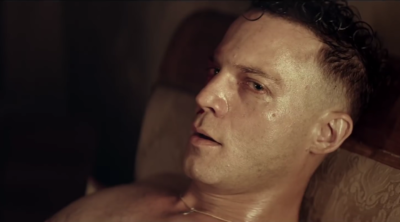
Adding to Szymanska’s concern was Itay Tiran. “We wanted to work with Itay but we didn’t have the money for him. . .He obviously wanted to work with us but there was difficulty with the Israeli Film Fund because we were the first Polish production being supported by the Israeli Film Fund. The conditions are usually that they need to have either the director [be Israeli] or they need to shoot in Israel. Neither of the conditions were in place at that time. We had only the Israeli actor. But they liked the project a lot so they agreed with the minority co-production and we could work together. It was very difficult.”
“It took us a really long time to develop the script, to get the financing for the movie. It was an uneasy project. First, the subject -Polish-Jewish relations, which is inconvenient for some and, the second thing was that it’s a mixed genre movie and everyone was like, ‘It’s very risky.’ But, we were very determined. Once it started clearing up with the budget, we knew we would be able to do it as we wanted.”
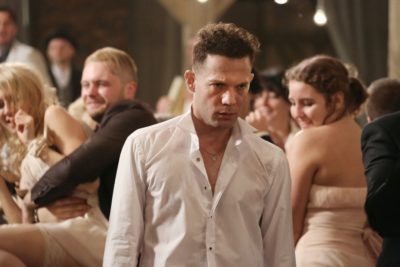
A stunning aspect of DEMON is the score. So much of the score and its undercurrents has the mind going in one direction while the story then takes you in the opposite. Wonderful dichotomy. As Szymanska explains, as it turns out, scoring on DEMON was very serendipitous. “Marcin usually worked with Marcin Macuk as his composer. With Polish weddings the music is disco. And it’s really bad. [laughing] We knew it was going to ruin the atmosphere of the wedding and we were trying to find something else. We thought, okay, we have Pyton coming from Britain. We have the location for the wedding in the old barn, so maybe let’s go for some traditional folk music. We started doing the research and found the band that we see playing [in the film]. They’re playing their music. We changed it a little bit to be more modern, but all the songs on the wedding come from the traditional folklore music and some of them are over 100 years old.”
But as every producer knows, when it comes to music there’s no such thing as a free ride and copyright and licensing fees can quickly eat up the budget. With the wedding band in place, Wrona and Szymanska knew they would need something for the horror scenes. “The first idea was Krzystof Penderecki. His music was in ‘The Shining.’ I would say he’s the best living Polish composer at the moment. Very distinctive. But how to get the music from Penderecki, that could be tough.”
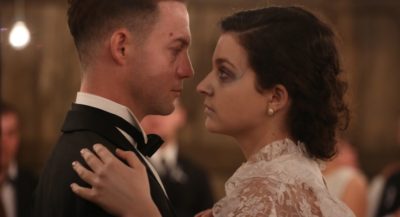
Expounding on a story she clearly enjoys telling, “Marcin went to his house. He lives not far from Krakow. . .Penderecki, when he heard the idea for the film, he was very excited and he said, ‘Okay. I will give you the music for free. But you need to go with my agent for the rest and deal with that. But, I don’t want any money from you for using my music.’ At the beginning he was even thinking about writing something for us but he’s completely busy so he said we can use whatever we like. He would just like to approve it and see how we’re going to use it.” Following a private screening before the film was completed, Penderecki stepped in with musical requests. “We had to rent a studio, get an orchestra which was approved by Penderecki, which wasn’t that easy. . .It turned out for some of the parts there are 50 people playing at the same time. After long talks with Penderecki he told us what we exactly need and how many people we will need and what orchestra to take, which studio. He had to supervise everything.” In the end, despite Penderecki foregoing his licensing fees, “it turned out that the rights from the agent were pretty expensive and licensing from different orchestras were even more expensive.” Describing Penderecki’s music as “disturbing”, the scoring is transportive and hypnotic. From the opening oboe with nail-on-chalkboard violin strains being added, an assault of unease begins to seep into your sense. First the visual palette and then the auditory. Score is for the most part subtle, but omnipresent and telling, reeling you into the mystery of DEMON.
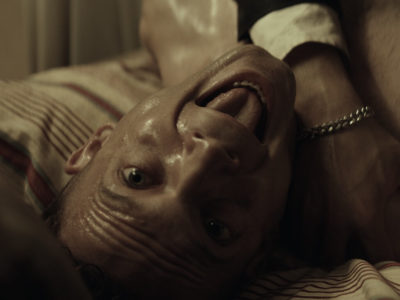
Given that Wrona and Szymanska were not only business partners and collaborators on the film, they were also husband and wife which begs the question as to whether she was on set for the entire shoot. “No. No, no no! That would be too much. [laughing] We decided I’m not going to be present all the time. I was there maybe 40% of the time. . . Working together and being a couple is very demanding, especially in such a situation as being on set. I know it won’t be good for any of us. Someone had to stay in Warsaw just in case and there were some other projects going on. We had this deal that I’m doing development, I’m doing part of the promotion and international, but once we start shooting we have the people who work for us – the production manager and others – taking care of what’s going on on set. It would be too stressful for us. It was stressful without me being on set all the time! I was giving my support. I was coming there three days a week or less, but I wasn’t present the whole time.”
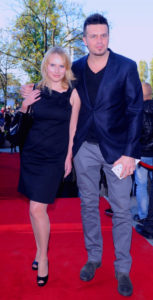
As Olga Szymanska reflects on Marcin Wrona and his gift to cinema, she is both pragmatic and proud, but also a bit wistful. “I had a feeling that he had directing in his blood. It was so natural for him. He was so focused on his work. Maybe I’m weird, but the whole shooting is not magical at all. You have the whole crew, there are so many people. You have all the cables, cameras, everything. Like a war zone. And then you have a masterpiece and you see how it works together. I think he had this amazing gift to work with people, especially with actors. And you can see the same actors in different movies when they work with other directors and you think, ‘They are really terrible in this!’ But in Marcin’s work, he could always find some new actors and give them the opportunity to play in his movies and they were absolutely amazing. In his previous movie, ‘The Christening’, the main role was played by Tomasz Schuchardt, he’s the bride’s brother, and it was his first role. He got the main role in ‘The Christening’ together with another actor who was in Marcin’s previous movie already. The two of them got the main prize in the Polish Film Festival for Best Performance. It was very much like this. . . He had this sense of finding new faces and giving them the chance to perform. Usually they performed best in his movies. And sometimes [he was ] giving the opportunity to someone who’s almost at the end of their career. He would find the potential in that person and give them one more chance.”
But what about Olga herself? DEMON isn’t just about Marcin. She also invested time and work in making DEMON the success that it is. “I have this weird feeling that we only have what we have now. You can never predict your future. You need to take from life what you get in certain moments without thinking ‘okay next month will be better, I will be a different person, I will be in a different place.’ You need to think about the present and that’s all that counts, I think. To put the energy on something you believe. I had a very difficult year. I know that DEMON is very important. Whatever happened to me, I need to keep on working on this project . . .It was a part of my life. It was my work, my free time. Because when you’re with a director and you are his producer at the same time, it’s hard to separate work from private life.”
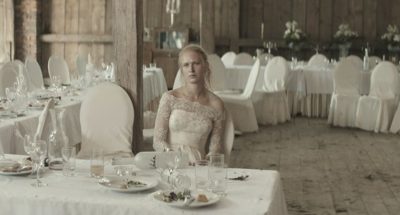
With one Marcin Wrona script remaining that is not yet filmed, in addition to other development projects with her new partners, Olga Szymanska has something important on her bucket list. “I would like to film the script because I think there was a lot of his work in that, a lot of my work as well. I just feel that leaving it unfinished is not the right thing to do. It’s just a waste of our time not to complete it. . .I’m just doing what I feel. I have no pressure from anywhere so I can give myself some time and do it wisely.”












